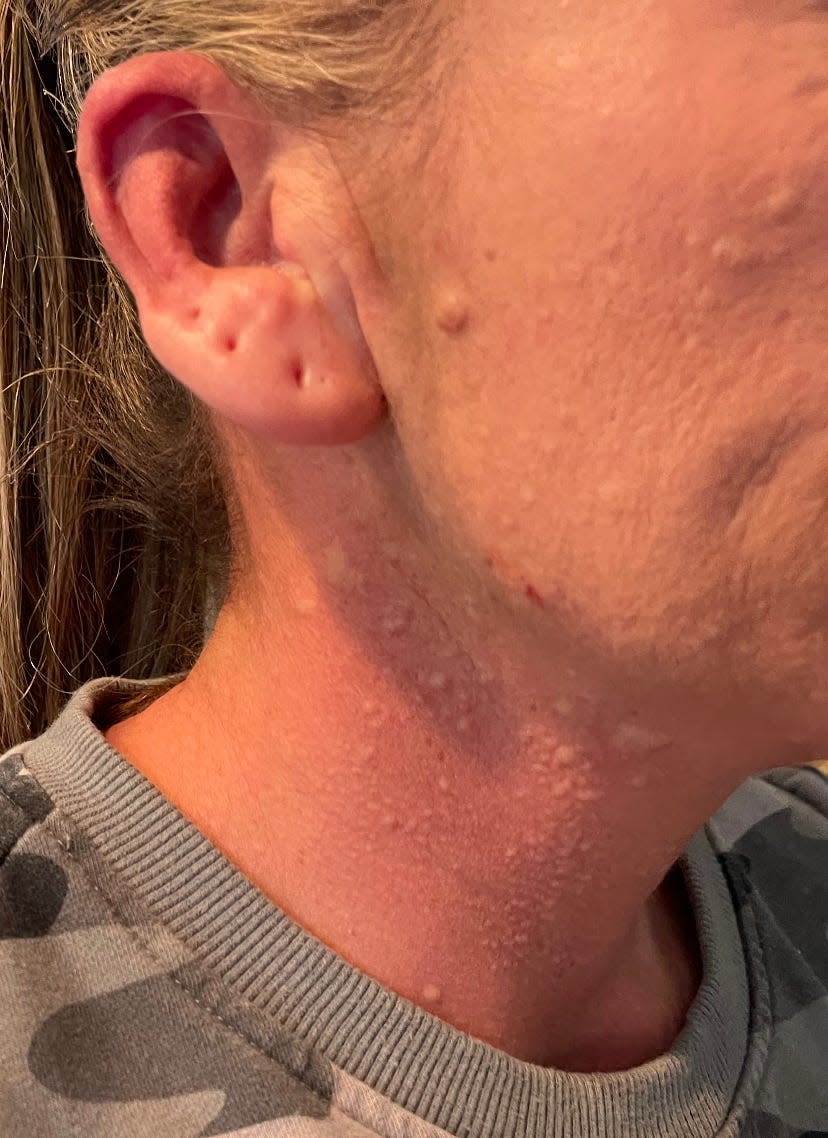'Wanting to tear my skin off': Alpha gal meat allergy from ticks could sneak up on you
Around 1 a.m., while the rest of Shrewsbury was asleep, Emilee Carton woke up scratching.
At first, she thought it was from mosquito bites. Then, before she had time to consider other possible causes, she was covered head to toe in hives. She took Benadryl, jumped in a cold shower and even tried jumping into her pool for relief.
“I was just crying, wanting to tear my skin off,” she said.
After what felt like hours of torture, Carton fell back asleep, not knowing that that was only a glimpse of what was to come.
Carton had unknowingly become the latest victim of alpha-gal syndrome, an allergy caused primarily by a bite from a lone star tick. With this, eating any mammal meat could cause her to break out in hives or even go into anaphylaxis.
Just three days earlier, she’d been participating in the World Series of Birding, helping a team to identify as many birds in the area as possible. She started before sunrise in Sandy Hook and planned to keep going long after sundown.

Though she’d never had an experience with ticks, Carton headed out dressed in a long-sleeved jacket with a shirt underneath, long pants, socks and sneakers, and with a healthy coat of tick spray.
“Better be safe than sorry,” she said.
During the pandemic, she took up wildlife photography as a hobby after having always been a nature person. It’s not out of the ordinary for her to spend her days outside in swamps, crawling through ditches or stomping through high grasses.
But when she got home for a midmorning break, she noticed her stomach was rather itchy. She lifted her layers of clothes to find 12 ticks latched on to her.
As she plucked them off, she tried to reason with herself: they weren’t embedded in her skin and they weren’t deer ticks, so she was probably fine. Still, she took note of the white dot in the middle of each of their bodies and told herself to look up what kind of tick they were later. She made a doctor’s appointment just to be safe, but wasn’t worried.
When she’d finished pulling off the ticks, hard lumps the size of marbles formed under her skin, and little craters sat atop each bite.
“I love wildlife, but it was freaking gross,” she said. “I googled it, it said [the lumps were] typical.”
The next day, she was back at work. She felt fine but went to see a doctor just in case. They prescribed her antibiotics.
That night, she woke up to the itching.
Her doctor thought it must have been the medication she was allergic to, since that was the only change she’d made in her normal routine. Her antibiotics were switched.
But a couple weeks later, it happened again, prompting her to make an appointment with an allergist. The soonest was nearly two months out.
Then, while running errands one afternoon, a little bump showed up on her hand and a “zing” rang through her body. Carton said it felt like being internally electrocuted.
“Almost like you were getting morphine,” she said. “It was strange.”
As she rushed home, her lips and ears swelled.

“I looked unrecognizable and then my throat started closing,” Carton said.
Her husband called 911. In the ambulance, they gave her fluids and epinephrine. At the hospital, doctors couldn’t offer any explanation.
“So now I’m scared to live because they don’t know what’s going on,” she said.
When Carton’s sister brought up alpha-gal syndrome as a possible explanation, she brushed it off.
“There’s no way that’s me,” Carton said.
Alpha-gal is a sugar molecule found in most mammals, according to the Centers for Disease Control and Prevention, but not fish, reptiles, birds or people. It can be found in meat like pork, beef, lamb, rabbit and venison, along with products made from mammals, like gelatin and cow’s milk.
Alpha-gal syndrome – also known as alpha-gal allergy, red meat allergy or tick bite meat allergy – is mostly associated with bites from the lone star tick, according to the CDC. Other kinds of ticks have not been ruled out, though.
https://www.cdc.gov/ticks/surveillance/LoneStarTick.html
Lone star ticks are widely distributed in the eastern, southeastern and south-central United States, the CDC said. As of 2022, both Monmouth and Ocean counties have established populations, meaning six or more lone star ticks of a single life stage, or more than one life stage collected in the county within a period of one year.
The allergy can be severe and even life-threatening, the CDC said, with symptoms including hives or itchy rash, nausea or vomiting, heartburn or indigestion, diarrhea, cough, shortness of breath or difficulty breathing, drop in blood pressure, swelling of the lips, throat, tongue or eyelids, dizziness or faintness, and severe stomach pain.
“More research is needed to understand the role ticks play in starting this condition and why certain people develop AGS,” the website said.
Carton was convinced alpha-gal syndrome wasn’t what was affecting her because she wasn’t eating when reactions would happen, she said. It wasn’t until she learned the reaction could be delayed several hours after consuming mammal meat that she began putting the pieces together.
“I guess I never really thought about the fact that I don’t eat pork or steak or sausage…all that often,” she said.
According to Dr. Edward Liu, Chief of Infectious Diseases at Jersey Shore University Medical Center, many tick-borne illnesses are commonly seen in New Jersey, like Lyme disease, ehrlichiosis, babesiosis and anaplasmosis and some Rocky Mountain spotted fever.
But alpha-gal is different because it’s an allergic response to a protein in the tick, Liu said.
“Because your body doesn’t like that protein, it produces antibodies to it,” he said.
Those antibodies also cross-react with certain foods we eat, including mammalian meat, he said. It’s not an actual infection, it just causes your body to have an allergic reaction to common food in our diet.
Liu said some people will get it and some people won’t, it just depends on how your body reacts to certain stimuli, and it’s not clear why.
“Some people are very allergic to mosquitoes, some people are not that allergic to mosquitoes,” he said. “I think it depends on the person and their immune system.”
At her appointment, the allergist confirmed Carton had the allergy.
“We did the blood test and sure enough,” she said. “That test, I mean, [it was] off the charts.”
Liu said that the relatively new blood tests, along with knowledge of a patient’s diet, outdoor exposure and history or tick bites, are all used for diagnosis.
So far, mammal products like gelatin do not seem to affect Carton like meat does.
“It’s just such a bizarre allergy to have,” she said.

There are no treatments, and the recovery time is unclear.
Liu said if you don’t realize you have the allergy and continue to eat mammal meat, symptoms will get worse and worse.
“The more your body sees something it doesn’t like it’s going to have a stronger response each time [and get] worse and worse each time,” he said.
Avoiding meat will improve your symptoms, but the allergy doesn’t last forever, Liu said. It can last at least several months.
And while allergists can try antihistamines and other means of decreasing the allergic reactions, Liu said there’s a better option.
“I would say that changing your diet is probably the best solution in the short run,” he said.
For now, Carton is doing just that.
“Based on what happened, I don’t think I’m going to be testing it,” she said.
According to the Mayo Clinic, the best way to prevent alpha-gal syndrome is to avoid tick-ridden areas, like wooded, bushy areas with long grass. But covering yourself with clothing, using insect repellent with a 20% or higher concentration of the ingredient DEET and being mindful about checking your skin after coming indoors can also lower your risk.
Carton said two of her biggest loves are the outdoors and the grill, and, while she may have to stay away from the latter, she’s not giving up on her affinity for nature and wildlife.
“I am an outdoor lady in every way,” she said.
Now, she’s looking forward to her next adventure in Pennsylvania to see the elk bugling in October.
“I have to find a way to make it all work,” she said. “I can’t give it up.”
Jenna Calderón covers breaking news and cold cases in Monmouth and Ocean counties. Before coming to the Press, she covered The Queen City for Cincinnati Magazine in Ohio. Contact her at 330-590-3903; jcalderon@gannettnj.com
This article originally appeared on Asbury Park Press: Lone star ticks in NJ could make you allergic to mammal meat

